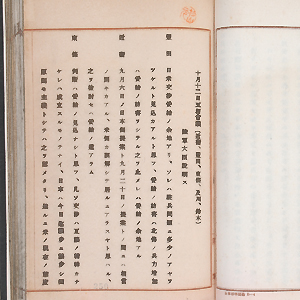 |
 |
October 12, 1941
Prime Minister Konoe holds a meeting with Minister of Foreign Affairs Toyoda, Minister of the Army Tojo, Minister of the Navy Oikawa, and Minister of the Cabinet Planning Board Suzuki regarding the advantages and disadvantages of war. The navy opposes withdrawing troops from China. |
|
 |


“October 12, Five-Minister Conference” (Page 1)
(Offered by the National Institute for Defense Studies of the Defense Agency)
|
 |
On Sunday, October 12, 1941, Prime Minister Konoe invites Minister of Foreign Affairs Teijiro Toyoda, Minister of the Army Hideki Tojo, Minister of the Navy Koshiro Oikawa, and Minister of the Cabinet Planning Board Teiichi Suzuki to his private home for a discussion about the advantages and disadvantages of war. During the meeting, Konoe and Toyoda point out possible solutions, including withdrawing troops from China, however, Tojo strongly opposes.
|
|
|
|
|
Document 1; October 12, Five-Minister Conference (Konoe, Toyoda, Tojo, Oikawa, Suzuki) (“The Minutes of the Imperial General Headquarters and Government Liaison Conference, Vol. 2.” (The Sugiyama Memo) Image 66 to 75)
|
 |
 |
 |
|
Document 2; October 12, 1941, (“Confidential War Diary; Vol. 3”; Images 166 to 167) |
 |
 |
|
|
On October 12th, 1941, Prime Minister Fumimaro Konoe summoned Foreign Minister
Teijiro Toyoda, Minister of War Hideki Tojo, Minister of the Navy Koshiro Oikawa and Cabinet Planning Board President Teiichi Suzuki to a private residence in Ogikubo to hold talks revolving around the outcome of the Japanese-American negotiations, and the decision to begin hostilities.
Document 1 is a record focusing on the speech given by Minister Tojo at the talks. Firstly, Minister Toyoda stated that “There is room for an agreement in the US-Japan talks”, indicating the point of view that, in regards to the troop stationing problem, the negotiations would probably be a success. Prime Minister Konoe also pointed out that lack of firmness in the Japanese proposals may have created doubts on the United States side, and if these points were dealt with the negotiations may yet be a success. Minister Oikawa, not stating a clear opinion, took a stance indicating that he would trust whatever decision was reached by Prime Minister Konoe. In contrast to this, Minister Tojo stated, “I think there are no prospects for a settlement” and in addition to taking an uncompromising stance against the United States, believed that the negotiations would not succeed.
Hereafter Minister Tojo, while stating that army preparations were already underway in preparation for the beginning of October (where as decided on the September 6th Imperial Conference, upon failure of negotiations war would begin), strongly asserted that in order to determine successful negotiations (i.e. the discontinuation of war preparations) it would be essential that a reliable foundation be shared between the government and the high command (leaders of the army and navy). Through this posturing, Minister Tojo demonstrated his unrelenting resolution to follow the decision reached at the 6th Imperial Conference, held on September 6th.
Even in Document 2, the “Confidential War Diary”, there is a great deal of reference to these talks. In relation to the give and take of the talks, minutes of the above-mentioned “Sugiyama Memo” give a nearly identical account making clear the differences between Ministers Konoe and Toyoda, who were debating the possibility of successful negotiations, and the refutations of Minister Tojo, who asserted the plan to follow the decision reached at the Imperial Conference. In this situation, Prime Minister Konoe called Minister Oikawa’s reticence to clearly speak his mind a “complete avoidance of responsibility”, and said “If you cannot say whether or not to wage war then do what you have confidence in”, which was in turn harshly criticized as “irresponsible nonsense.”
|
 |
|
|
|
 |
|